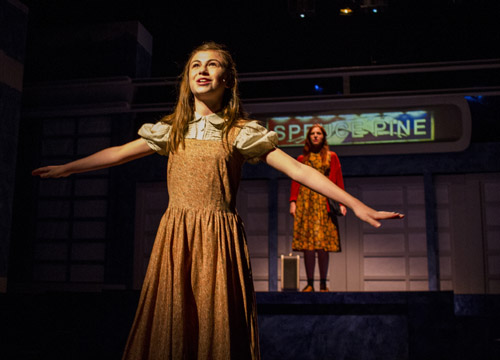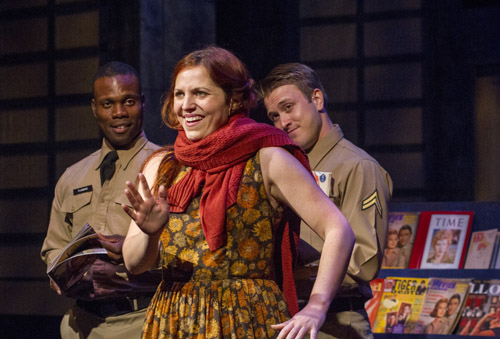
By Donald H. Harrison

SAN DIEGO—As we exited Violet, a musical now playing at the San Diego Repertory Theatre, my 14-year-old grandson, Shor, said he wished the title characters, Violet as an adult (Hannah Corrigan) and Violet as a child (Katelyn Katz) had been made up with a terrible scar on the right side of their faces so he could visualize what it was about the character that made people recoil in horror.
To be truthful, I thought before attending the two-hour play that that was exactly what they would have done, but now, having seen the production, and having discussed the matter with Shor on the way home, I think I know why they didn’t put fake scar on her. There’s nothing that so crystallizes your thoughts as having to try to explain something to your grandson.
Before I go on, let me give you the outline of the plot based on Doris Betts’ story The Ugliest Pilgrim as directed by Sam Woodhouse, choreographed by Javier Velasco, and musically directed by Korrie Paliotto. The music was by Jeanine Tesori and the lyrics and book by Brian Crawley.
Accidentally disfigured by the axe of her father (Jason Maddy), Violet grew up an outcast. People cringed whenever they saw her. Other children shunned her, and her father could barely bear to be with her.
She grew up watching a televangelist (Jason Heil), and convinced that he could heal her, she saved up her money to take a bus from her sleepy hollow of a town in North Carolina to the preacher’s church in Oklahoma. Along the way, she meets two soldiers—one black (Rhett George), one white (Jacob Caltrider)—who are both kind to her, and seem to have a good relationship with each other, notwithstanding that this is the American South during the 1960’s era of the Civil Rights struggle.
Does the white corporal really love her, or does he just want her for sex? And with the black sergeant, what is their connection that goes deeper than their skin?

I suggested to Shor that it wasn’t by accident that director Woodhouse (who is the artistic director of the San Diego Rep) left the scar off Violet’s face. It had to have been an issue he thought about quite deeply. I suggested there might be a parallel with the Hans Christian Anderson tale The Emperor’s New Clothes.
Despite what the emperor had been fooled to think about himself and his clothing, his audience of townspeople saw the real emperor as naked as the day he was born. In Violet, no matter what Violet thought about herself, having been subjected her entire life to superficial reactions to her scar, the audience at the Rep saw the real Violet.
Though she had a scar on her face, Violet wasn’t disfigured at all. Inside, she was a beautiful person, one with feelings and compassion for other people, and a gentleness despite everything that had happened to her. That was the Violet we were supposed to see. The lack of ugly make-up was intended to portray the inner Violet, not the outer one.
Violet’s interactions with the major male characters in the play are a study in themselves. Her father was so consumed by guilt, he could not communicate to her the love and reassurance that she needed. The soldiers who accepted her who she was, even falling in love with her, helped on her path to self-realization. And the preacher, whom she realized to her great distress was nothing but a fraud—a Wizard of Oz type character, who could not stand the scrutiny of people who looked behind the curtain—unknowingly helped her to shed her illusions.
When the preacher was in his pulpit, calling people to Jesus, he was charismatic. But alone and vulnerable, we learned that however fraudulent he was, once he sincerely believed he had the calling.
Violet is a strong production, with many actors deserving kudos. I was charmed and impressed by Katelyn Katz’s professional presence as she played the young Violet. She’s a trouper that youngster, with a very big future ahead of her. I’m sure her parents would tell us she gives them lots of nachas – deservedly so.
The trio of Rhett George, Hannah Corrigan and Jacob Caltrider, who carried the main action, worked well together both as singers and actors. At times I thought the sound system had been amped up too high, distorting their voices, but their energy and passion for their parts overcame such technical difficulties.
Of the supporting cast, one has to give shout outs to singers Tanika Baptiste, whose gospel performance raised the audience up, and to Anise Ritchie, who played a sultry music hall singer down Memphis way.
Melinda Gilb, who played an older lady who was Violet’s part-time seat mate on the bus, and also portrayed a humorous Memphis hooker, as well as a singer in the preacher’s choir, showed wonderful versatility.
Kudos go as well to the musicians who backed up the singers, including a Jewish community favorite, violinist Myla Wingard.
Violet will continue on the Lyceum stage of the San Diego Rep through September 13.
*
Harrison is editor of San Diego Jewish World. You may comment to him at donald.harrison@sdjewishowrld.com